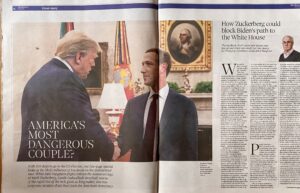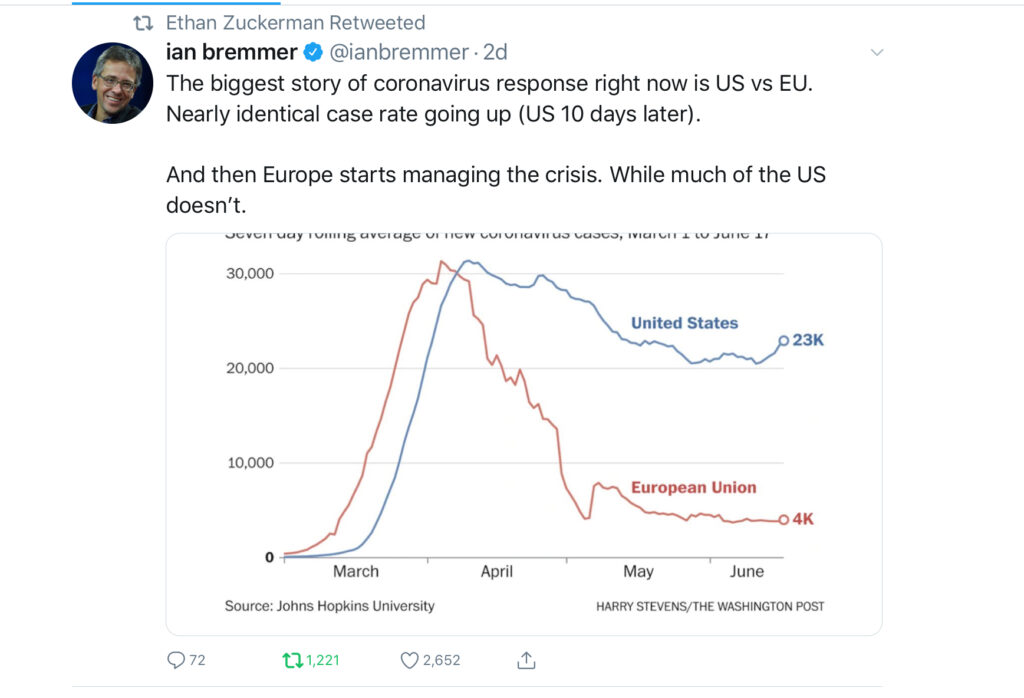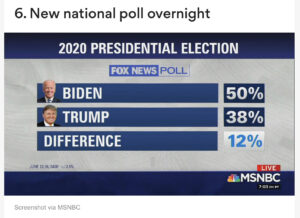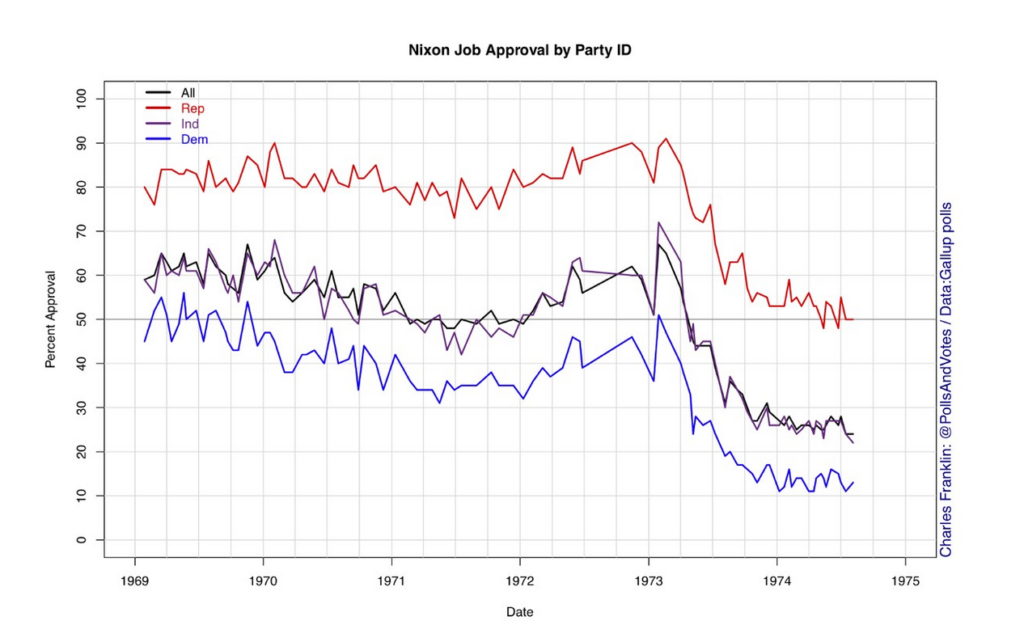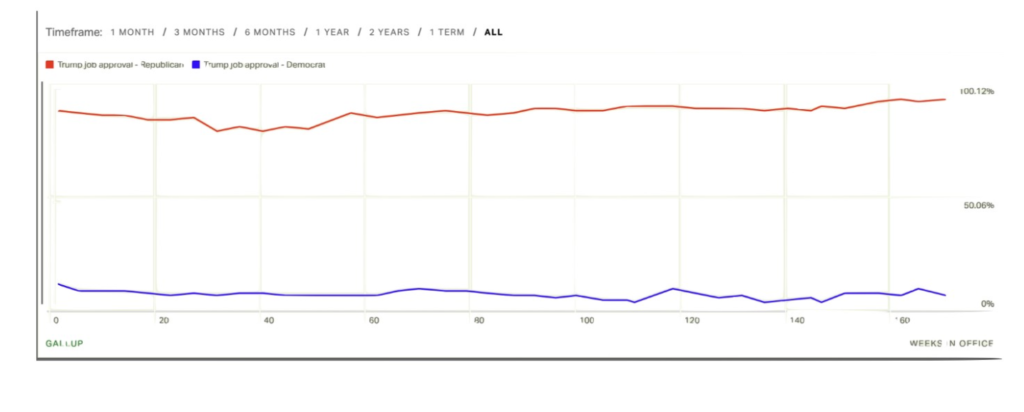A note to subscribers
If you elected to receive this blog as a daily email and are finding that it’s not arriving regularly (as some people have been), please check your spam filter. It seems that some filters automatically suspect stuff that comes from services like Substack.
The UK’s contact-tracing app difficulties
This morning’s Observer column:
Some day, we will have a reckoning for how the Johnson administration screwed up so comprehensively. But that will have to wait, because it is still screwing up. The current focus of interest is why it took it so long to realise that the only way to deal with the threat was lockdown, contact tracing and quarantining, a methodology familiar to Europeans since at least the time of the Black Death. And when the history of this time comes to be written, one interesting case study in official ineptitude will focus on the British search for its very own “world-beating” smartphone contact-tracing app.
The best interim report we have on this quest has been compiled by Rowland Manthorpe of Sky News…
“Hurting people at scale”: at last, Facebook employees are beginning to wonder whether they want to be part of the Zuckerberg project
Very interesting Buzzfeed report:
On July 1, Max Wang, a Boston-based software engineer who was leaving Facebook after more than seven years, shared a video on the company’s internal discussion board that was meant to serve as a warning.
“I think Facebook is hurting people at scale,” he wrote in a note accompanying the video. “If you think so too, maybe give this a watch.”
Most employees on their way out of the “Mark Zuckerberg production” typically post photos of their company badges along with farewell notes thanking their colleagues. Wang opted for a clip of himself speaking directly to the camera. What followed was a 24-minute clear-eyed hammering of Facebook’s leadership and decision-making over the previous year…
Here’s the recording of his farewell message obtained by Buzzfeed. The audio quality is poor (too much treble), but the content is fascinating.
What the Buzzfeed (longish) report suggests is that there is growing employee unease within Facebook about the direction the company is taking. Personally I’m sceptical about this having a major impact in the short- to medium-term. After all, the pay is good, the work (for geeks at least) may be technically interesting, and many smart and apparently decent people work for, say, arms manufacturers or tobacco companies.
Longer term, though, the shine has gone from Facebook and so I can imagine that some of the smarter computer science graduates might now have reservations about working there. For them, it’ll have become more like Palantir — something you might not want to tell your friends about.
Zuckerberg, Trump and November’s Election
The Observer has a big feature-spread today about Trump, Zuckerberg and the presidential election, with contributions from me, Carole Cadwalladr, Yaël Eisenstat and Roger McNamee.
My essay focusses mainly on Zuckerberg’s total control of the company and his possible motives for the decisions he’s been making.
So here we are in 2020, 100 days from the presidential election. Trump is still trailing Biden. But his base support has remained solid. So the point I made in June still stands: if he is to win a second term, Facebook will be his only hope – which is why his campaign is betting the ranch on it. And if Facebook were suddenly to decide that it would not allow its platform to be used by either campaign in the period from now until 3 November, Trump would be a one-term president, free to spend even more time with his golf buggy – and perhaps his lawyers.
For Facebook read Zuckerberg, for Facebook is not just a corporate extension of its founder’s personality, but his personal plaything. I can’t think of any other tech founder who has retained such an iron grip on his creation through his ownership of a special class of shares, which give him total control. The passage in the company’s SEC filing detailing this makes for surreal reading. It says that Zuckerberg “has the ability to control the outcome of matters submitted to our stockholders for approval, including the election of directors and any merger, consolidation, or sale of all or substantially all of our assets. This concentrated control could delay, defer, or prevent a change of control, merger, consolidation, or sale of all or substantially all of our assets that our other stockholders support, or conversely this concentrated control could result in the consummation of such a transaction that our other stockholders do not support.”
Such a concentration of power in the hands of a single individual would be a concern in any enterprise, but in a global company that effectively controls and mediates much of the world’s public sphere it is distinctly creepy…
Carole’s piece is here.
Ian Tucker’s interview with Roger McNamee (an early investor in Facebook is here.
Ian’s interview with Yaël Eisenstat (a whistleblower) is here.
Friend Monitors?
Dave Winer has a good idea:
I have an app called Server Monitor that does something simple but important. It pings each of the apps I have running once a minute to see if they’re still alive. If not, SM sends me an email. I bet everyone who writes server apps has this kind of utility.
I’d like something like this for my friends. A ping goes out to each, if someone doesn’t respond, I get an email.
In the age of The Trump Plague, I worry about my friends.
Me too. I’ve been thinking for a while that I should do something like this. Maybe a small email group to which I send a message a week asking just for a one word reply: OK (or, if not, No) maybe.
Central London Rents Decline as Vacation Homes Flood Market
Well, well. Bloomberg reports
Rents for homes in central London had a record decline last month as landlords flooded the market with properties previously rented out through companies such as Airbnb Inc.
Houses in the city center rented for 7.4% less than a year earlier in June, according to data compiled by broker Hamptons International. The number of homes available to rent shot up by 26% in inner London, driven by houses previously occupied for short periods by visitors to the capital moving to the long-term market.
What Brexit started, the virus has continued. Long overdue IMO.
This blog is also available as a daily email. If you think this might suit you better, why not subscribe? One email a day, delivered to your inbox at 7am UK time. It’s free, and there’s a one-click unsubscribe if you decide that your inbox is full enough already!

